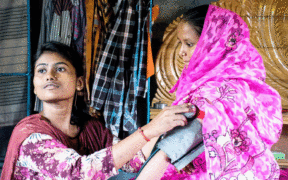Author:
A. K. Shafiqur Rahman
Project Integration Adviser, Bangladesh Center for Communications Programs (BCCP)
Mr. Shafiqur Rahman is a seasoned behavior change communications (BCC) expert, with over 30 years of progressively senior level experience in conceptualizing, designing, implementing, coordinating and monitoring of strategic communication, community mobilization and SBCC capacity building interventions for international and national development agencies in Bangladesh. Presently working with Bangladesh Center for Communications Programs, Mr. Rahman has been responsible for strategic planning and guidance to project teams, GoB level TA and NGO partners in the fields of public health, education and good governance, with special expertise in family planning/reproductive health and other programs targeting women, girls and youth.

Bangladesh has the highest rate of child marriage in Asia. Early marriage leads to a poorer quality of life for girls. It is detrimental to their agency and ability to obtain or continue education. So, in order to improve young couples’ quality of life and encourage them to make informed decisions, the Bangladesh Center for Communication Programs (BCCP) collaborated with the Directorate General of Family Planning to introduce a national Premarital Counseling (PMC) Guidebook.
Listen to “Inside the FP Story”
Grab a cup of coffee or tea and listen in on honest conversations with family planning program experts around the world as they share what has worked in their settings — and what to avoid — in our podcast series, Inside the FP Story.
Click on the image above to visit the podcast page or on your preferred provider below to listen to Inside the FP Story.
Stay Updated
with the latest trending news
About
Knowledge SUCCESS is a five-year global project led by a consortium of partners and funded by USAID’s Office of Population and Reproductive Health to support learning, and create opportunities for collaboration and knowledge exchange, within the family planning and reproductive health community.
Contact
Johns Hopkins Center for Communication Programs
111 Market Place, Suite 310
Baltimore, MD 21202 USA
Contact Us
This website is made possible by the support of the American People through the United States Agency for International Development (USAID) under the Knowledge SUCCESS (Strengthening Use, Capacity, Collaboration, Exchange, Synthesis, and Sharing) Project. Knowledge SUCCESS is supported by USAID’s Bureau for Global Health, Office of Population and Reproductive Health and led by the Johns Hopkins Center for Communication Programs (CCP) in partnership with Amref Health Africa, The Busara Center for Behavioral Economics (Busara), and FHI 360. The contents of this website are the sole responsibility of CCP. The information provided on this website does not necessarily reflect the views of USAID, the United States Government, or the Johns Hopkins University. Read our full Security, Privacy, and Copyright Policies.













